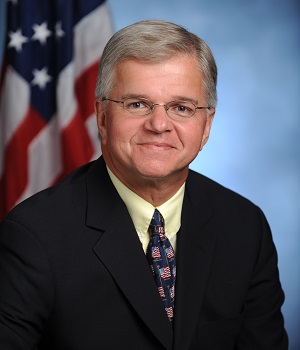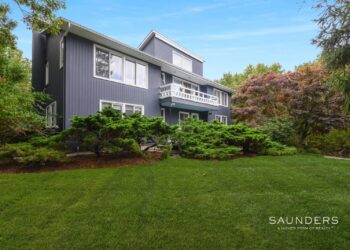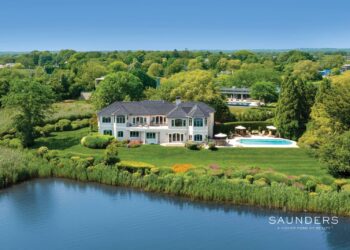I recently had the opportunity to sit down with Assemblyman Fred W. Thiele, Jr. at his 1st Assembly District office in Bridgehampton. We discussed issues of particular concern to his constituents and the various committees upon which he serves. Assemblyman Thiele is Chairman of the Small Business Committee and a member of the Education, Environmental, Oversight, Analysis and Investigation, Transportation, and the Ways and Means Committee, which is responsible for all proposed legislation dealing with state revenues and disbursements.
 |
|
Assemblyman Fred W. Thiele, Jr. (Courtesy Photo) |
The first topic we discussed was the Community Preservation Fund Transfer Tax, commonly known as the “Peconic Tax” which was enacted in 2000 in the five towns of Eastern Long Island – Riverhead, Southold, Shelter Island, Southampton, and East Hampton. The tax in Riverhead and Southold is 2 percent over the purchase price of $75,000 for unimproved properties, and 2 percent over the purchase price of $150,000 for improved properties. In Shelter Island, Southampton, and East Hampton, the tax is 2 percent over the purchase price of $100,000 for unimproved properties, and 2 percent over the purchase price of $250,000 for improved properties. The taxes are paid by the purchaser at closing. Due to the efforts of the East End legislators, spearheaded by Assemblyman Thiele, qualified first-time homebuyers may be exempt from the tax.
AFT: We have recently done two things with the program. We extended it a third time until 2050, so that we may continue to preserve space, particularly on the North Fork where there still remains a lot of unprotected space. The price of real estate over there is less expensive than the South Fork so the revenues have been less than the South Fork. Riverhead is oversubscribed. They need additional revenue. The second issue is water quality protection. It is the biggest quality of life issue, not only on the East End, but across Long Island. Up zoning and preservation are not enough to protect water quality. We have resisted the pressures to use the CPF revenues for many purposes other than preservation, for instance, tax abatement and operating expenses. But if you protect the land and lose the water quality, you haven’t protected anything. So the new legislation allows up to 20 percent of the revenues to be used for water quality projects, especially nitrogen reduction which is the biggest issue with water quality.
Is that legislation currently in effect?
AFT: No it’s not mandatory. The five towns, if they choose to implement it, have to go to referendum and put it to the voters in each of their towns.
So like the legislation that allowed each of the five towns to adopt legislation exempting qualified first-time homebuyers, could it be adopted by some and not all? For instance, Riverhead has chosen not to extend the first-time homebuyer exemption while the other towns have.
AFT: That’s correct. The state has enacted legislation allowing it. The towns would have to pass a local law implementing it, and as part of the process, the town would have to do a water quality test and a plan identifying the costs of implementation before it seeks approval of the voters. They will want to know where the money is going. They’re not going to sign a blank check to spend on water quality.
So there may be reasons why particular towns would not want to take advantage of the opportunity and choose to devote all of their revenues for the fund to land preservation?
AFT: Yes, that’s true, but as a mentor-colleague once told me, Peconic Bay is like one big bathtub, and when mom puts all of the kids in the tub, whatever one does affects all of the kids in the tub. So, the towns may want to do a water quality project together, since all of the towns share the Bay.
How might that work for Sag Harbor, since part of the Village is in East Hampton, and part is in Southampton?
AFT: Most of the land of Sag Harbor Village is in Southampton, but most of the water is in East Hampton. So I would expect that the municipalities would develop a cooperative effort. The state has funded two water quality studies, one to prepare a nitrogen reduction plan, and the second announced by the governor, a $6 million study of the aquifer. With water quality, we are about where we were twenty years ago with respect to land preservation. The choice isn’t between preservation and the economy. For us in this region, it’s both. They are very much related.
You serve on the Transportation Committee. Please share your thoughts on that.
AFT: My main focus had been trying to get more public transportation. There was a lot of work done about ten years ago, regarding shuttle trains on both the North and South Forks. The idea is to get people out of their cars and be able to move east and west to employment centers and downtown areas. Right now, there is no coordination between the bus systems and the railways. We provided funds to the MTA (Metropolitan Transportation Authority) to acquire diesels, but they haven’t moved forward on that, in fact, they reduced service to Greenport on the North Fork, especially during the winter. If the Long Island Rail Road had had any entrepreneurial spirit, the Hampton Jitney would never have happened. The problem on the South Fork is that we need a second track Sayville to Montauk. Then you could run a lot more trains. Senator LaValle and I have made a request for this year’s budget to include funds to build a second track. Because of the infrastructure on the North Fork, it would be easier to do it there first, from Ronkonkoma to Greenport. I know that the MTA has lots of issues to deal with, even getting the trains to run on a snowy day. But the governor has talked about running a third track in Nassau County. Senator LaValle and I said while you’re doing a third track there, maybe you should do a second track here so we can improve service.
There is a general consensus among the Towns of the need for affordable housing. Would you speak to that?
AFT: Yes. Everybody’s for it until you try to do it. Bridgehampton has been working on a mixed-use project on Route 27 for two years that would include affordable housing. It’s gotten a lot of opposition. One of my proposals is to have a “McMansion Fee.” If you build a house of more than 3,000 sq. ft., you pay a fee per square foot and the money goes into a fund to provide incentives to build affordable housing. Local governments are supposed to have a plan that balances the housing needs, and the state can provide funds to assist in the development of affordable housing, but in the final analysis, it’s the market that is going to determine the availability. Economic forces outweigh good intentions.
Please check back next week for the conclusion of this interview, where Assemblyman Thiele covers small businesses on the East End, this year’s budget, the “Mansion Tax,” and more.












